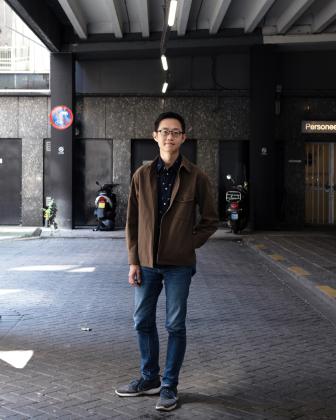Theophilus Kwek
ZINC
ZINK
Niemand weet hoe het gebeurt. Niemand weet hoe het
gebeurt. Niemand weet hoe het gebeurt. Het gebeurt
als volgt: een vader graaft een vijver in de rode grond. Vult die
met vis – een half jaar aan spaargeld – die hij over een paar
maanden voor meer verkoopt. De regen wast gif van hun zinken
dak, doodt de vissen, maar hij probeert opnieuw: bouwt een hek,
trekt een schoon stuk dekzeil over de zijkant. Binnen
een paar dagen komt, vol nijd, het vuur. Zijn oudste dochter rent
een helling op, een zus op haar rug, haar broers er vlak achter,
dragend wat ze maar kunnen. Het huis valt niet
te redden, noch het trouweloze dak, zelfs de vissen niet, die
de grond in zullen branden. Nog jaren daarna draait hij
de nachtdienst, speurt de lucht af voor regen, bewaart
de maandelijkse braamvis die ze eten voor zijn kleinste.
Of zo herinnert mijn moeder, nog altijd dol op die vis, het zich
Publisher: 2023, Voor het eerst gepubliceerd op PoetryInternational.com,
ZINC
No one knows how it happens. No one knows how it
happens. No one knows how it happens. It happens
like this: a father builds a pond in the red earth. Fills it
with fish—half a year’s savings—which will sell for
more in a few months. Rain washes poison off their zinc
roof, killing the fish, but he tries again: builds a rack,
runs a length of fresh tarpaulin over the side. Within
days the fire, envious, comes. His oldest daughter runs
up a slope, a girl on her back, her brothers close behind
and carrying whatever they can. There is no saving
the house, or its treacherous roof, even the fish, that will
be singed into the earth. For years afterwards he drives
the graveyard shift, watches the sky for rain, saves
the pomfret at dinner once a month for his littlest one.
Or so my mother, who still loves the fish, remembers.
Publisher: First published on poetryinternational.com,
ZINC
No one knows how it happens. No one knows how it
happens. No one knows how it happens. It happens
like this: a father builds a pond in the red earth. Fills it
with fish—half a year’s savings—which will sell for
more in a few months. Rain washes poison off their zinc
roof, killing the fish, but he tries again: builds a rack,
runs a length of fresh tarpaulin over the side. Within
days the fire, envious, comes. His oldest daughter runs
up a slope, a girl on her back, her brothers close behind
and carrying whatever they can. There is no saving
the house, or its treacherous roof, even the fish, that will
be singed into the earth. For years afterwards he drives
the graveyard shift, watches the sky for rain, saves
the pomfret at dinner once a month for his littlest one.
Or so my mother, who still loves the fish, remembers.
ZINC
Sponsors
















